Book contents
- Frontmatter
- CONTENTS
- Dedication
- Acknowledgements
- List of Contributors
- Introduction to Why Race and Gender Still Matter: An Intersectional Analysis
- Part I Defining Intersectionality
- Part II Doing Intersectionality
- 6 Continental Feminist Philosophy Meets Intersectionality: Rosi Braidotti's Work
- 7 Purposeful Nonsense, Intersectionality and the Mission to Save Black Babies
- 8 Transitional Subjects: Gender, Race and the Biopolitics of the Real
- 9 Caster Semenya: Reasoning Up Front with Race
- 10 Philosophical Happiness and the Relational Production of Philosophical Space
- 11 Theory Can Heal: Constructing an Ethos of Intervention
- Notes
- Index
7 - Purposeful Nonsense, Intersectionality and the Mission to Save Black Babies
from Part II - Doing Intersectionality
- Frontmatter
- CONTENTS
- Dedication
- Acknowledgements
- List of Contributors
- Introduction to Why Race and Gender Still Matter: An Intersectional Analysis
- Part I Defining Intersectionality
- Part II Doing Intersectionality
- 6 Continental Feminist Philosophy Meets Intersectionality: Rosi Braidotti's Work
- 7 Purposeful Nonsense, Intersectionality and the Mission to Save Black Babies
- 8 Transitional Subjects: Gender, Race and the Biopolitics of the Real
- 9 Caster Semenya: Reasoning Up Front with Race
- 10 Philosophical Happiness and the Relational Production of Philosophical Space
- 11 Theory Can Heal: Constructing an Ethos of Intervention
- Notes
- Index
Summary
nonsense |′nän,sens|
noun
1 spoken or written words that have no meaning or make no sense: he was talking absolute nonsense.
• [as exclamation] used to show strong disagreement: ‘Nonsense! No one can do that.’
• [as modifier] denoting verse or other writing intended to be amusing by virtue of its absurd or whimsical language: nonsense poetry.
2 foolish or unacceptable behavior: put a stop to that nonsense, will you?
Introduction
Outrage arose when Representative Todd Akin of Missouri argued against making exceptions to the abortion restriction for rape victims on the grounds that due to a woman's physiology ‘legitimate rape’ was unlikely to result in pregnancy. Although thoroughly denounced, the claim that there is some feature of biology that prevents rapes from resulting in pregnancy has taken root in the political and popular imagination. This falsehood has proven so irrepressible that one reporter at Slate.com has written repeatedly about the ultimate source of this idea: a confabulated Nazi experiment. Discourse with these features– a ‘strange’ genealogy; bad reasoning; persistence despite, at best, specious proof; and exploitation for what are, to some minds, malicious purposes – has become increasingly common in political discourse, the press and even the arguments made by ordinary folk.
Such discourse is oft en criticized for its falsehood or its hurtfulness; these critiques – aimed at singular features of this discourse – tend to miss its pernicious potential.
- Type
- Chapter
- Information
- Why Race and Gender Still MatterAn Intersectional Approach, pp. 101 - 116Publisher: Pickering & ChattoFirst published in: 2014

